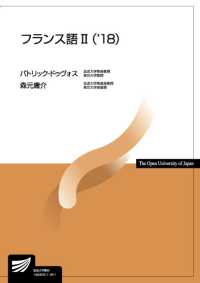- ホーム
- > 洋書
- > 英文書
- > Politics / International Relations
Full Description
Shifting the focus from land to sea when considering the Cold War in East Asia, Kuan-Jen Chen sheds light on the importance of the 'oceanic' lens as a structural imperative in grand strategic thinking. Despite extensive scholarship on postwar US-East Asia relations, questions about the relationship between maritime space, national sovereignty, and geopolitics have not been fully explored. Drawing on archives in Chinese, English, and Japanese, Chen uses the western Pacific as a historical platform, illustrating the relationship between the geopolitical value of the sea and the strategic deliberations of American and East-Asian decision making. The recent deterioration of US-China relations has turned maritime East Asia into a powder keg, with no country in the region able to remain neutral. By anchoring today's maritime East Asia in the past, this book traces the evolution of historical factors that led to the current status quo in the western Pacific, and shows the origins of controversial issues in the region.
Contents
Introduction; 1. Finding a Local Partner in Postwar Maritime East Asia; 2. The Creation of a Mainland-based Forward Strategy; 3. Vying for Top Dog: the Navy-Army Struggle in Maritime East Asia; 4. Termination of the Mainland-based Forward Strategy; 5. The 1950 Crises and America's Changing Posture of Defence; 6. The Making of a New Maritime Strategy; 7. The International Law of the Sea and America's Unreliable Partners; 8. America's Strange Bedfellows in the International Arena; 9. Fishing for Protein in Cold War East Asia; 10. Jostling for Position: Black Gold, Natural Resource Exploration and Shifting Political Contours; Epilogue; Bibliography.








